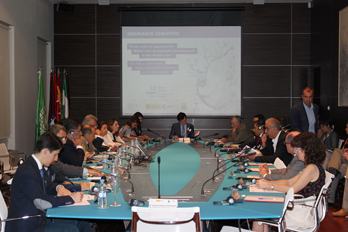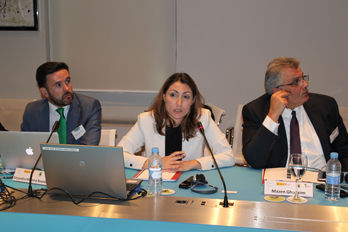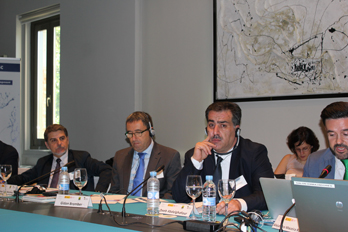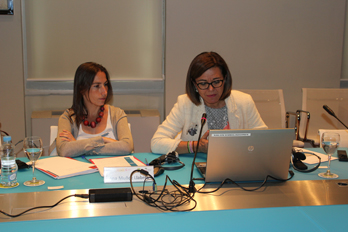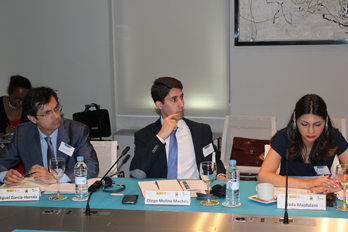
The seminar, funded by the Spanish Agency for International Development Cooperation (AECID), was structured in two sessions, during which the experts discussed solutions for water and sanitation in the West Bank and Gaza and water as a resource for The Regional Cooperation.
Following the welcoming remarks by Pedro Antonio Villena and María Beamonte, Directors of Casa Árabe and FPSC respectively, Mr. Mazen Ghuneim, Director of the Palestinian Water Authority, spoke.

Giulia Giordano, Eco Peace Middle East, then gave a presentation on “The State of Water Security in the Middle East”. According to her, the challenges facing the Middle East are chronic water shortages, climate change with rising temperatures and a lack of rainfall, population growth and political instability.
Then the first session was held, entitled “A bridge over the Jordan. Water as a Resource for Regional Cooperation “, which was attended by Deeb Abdelghafour, Director General of Water Resources of the Palestinian Water Authority, Gidon Bromberg, Israeli Co-Director of EcoPeace Middle East, Domingo Zarzo Martínez, Technical Director and Of ID i of VALORIZA Agua (SACYR) and Alejandro Maceira Rozados, Founder and Director of iAgua, who acted as moderator.Deeb Abdelghafour stated that the Palestinians have not been authorized to use and access the water of the Jordan River since the Israeli occupation of the West Bank in 1967, that the Master Plan of the Jordan River Basin has to be reformulated to reflect the needs of the Palestinians, and that Cooperation must be made on the basis of equity in order to reach a lasting and fair agreement.
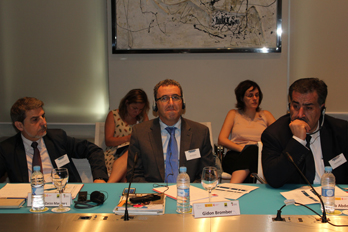
Domingo Zarzo, during his speech, stated that demand for water has increased six fold between 1915 and 2015. He commented that there has been an increase in unconventional water sources and that the Middle East is at the forefront of desalination. He added that eight of the twenty largest desalination companies in the world are Spanish.
Subsequently, the second session was held with the title “Water can not wait. Advancing water and sanitation solutions in the West Bank and Gaza “. Moderated by Ana Muñoz Llabrés, Head of the NGDO Department of the Spanish Agency for International Development Cooperation (AECID), Sandra Puig Infante, Head of Water Quality Control and Surveillance Water, Ministry of Agriculture and Fisheries, Food and Environment, Nada Majdalani, Palestinian Co-Director of EcoPeace Middle East, Miguel García-Herráiz, Deputy Secretary General, Water and Environment Union for the Mediterranean, and Diego Molina Machés, Graduate in Environmental Sciences & Master’s Degree in Water Engineering and FPSC Project Technician.
Sandra Puig addressed to the issue of saline intrusion in the Spanish Mediterranean basin as in Gaza.
Nada Majdalani, began his intervention with a plea: “Water can not wait!”. She commented on the paradox that 80% – 90% of the central aquifer recharge basin is in the West Bank, while 80% of the water from the central aquifer is used by Israel. She concluded that water issues can be solved today with low political costs for Israel but with high political benefits for Palestine.
Miguel García-Herráiz indicated that there are reluctance to innovate in the field of water and that there are links between water-energy and water-food security.
Diego Molina referred to the FPSC’s water projects in Palestine. The Foundation allocates approximately 15% of its resources to water projects. In addition, after an intense debate among those present, including Mr. Ramón Llamas, Director Emeritus of the Water Observatory of the Botín Foundation, was in charge of reading the conclusions of the seminar, after which it concluded.






